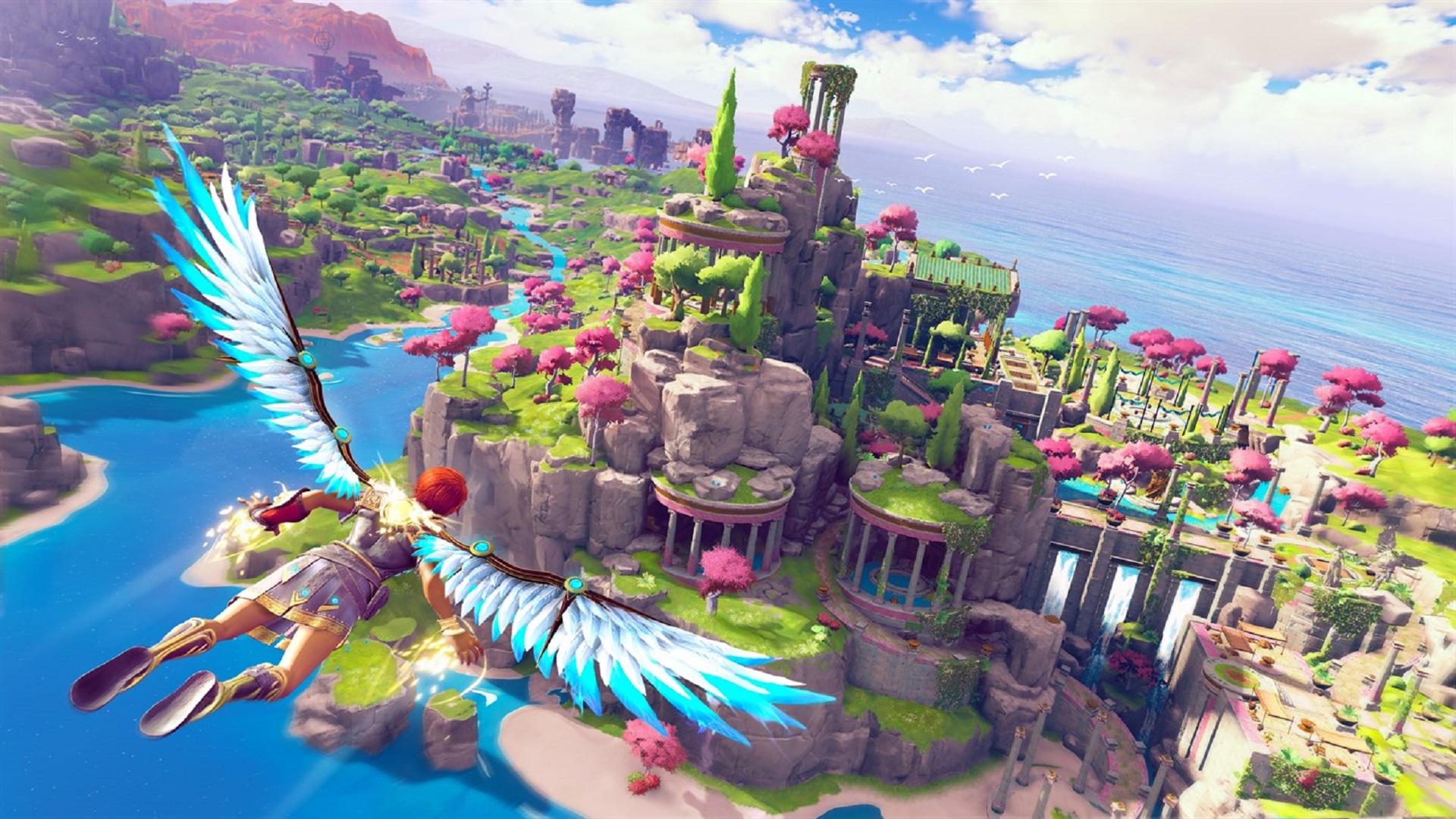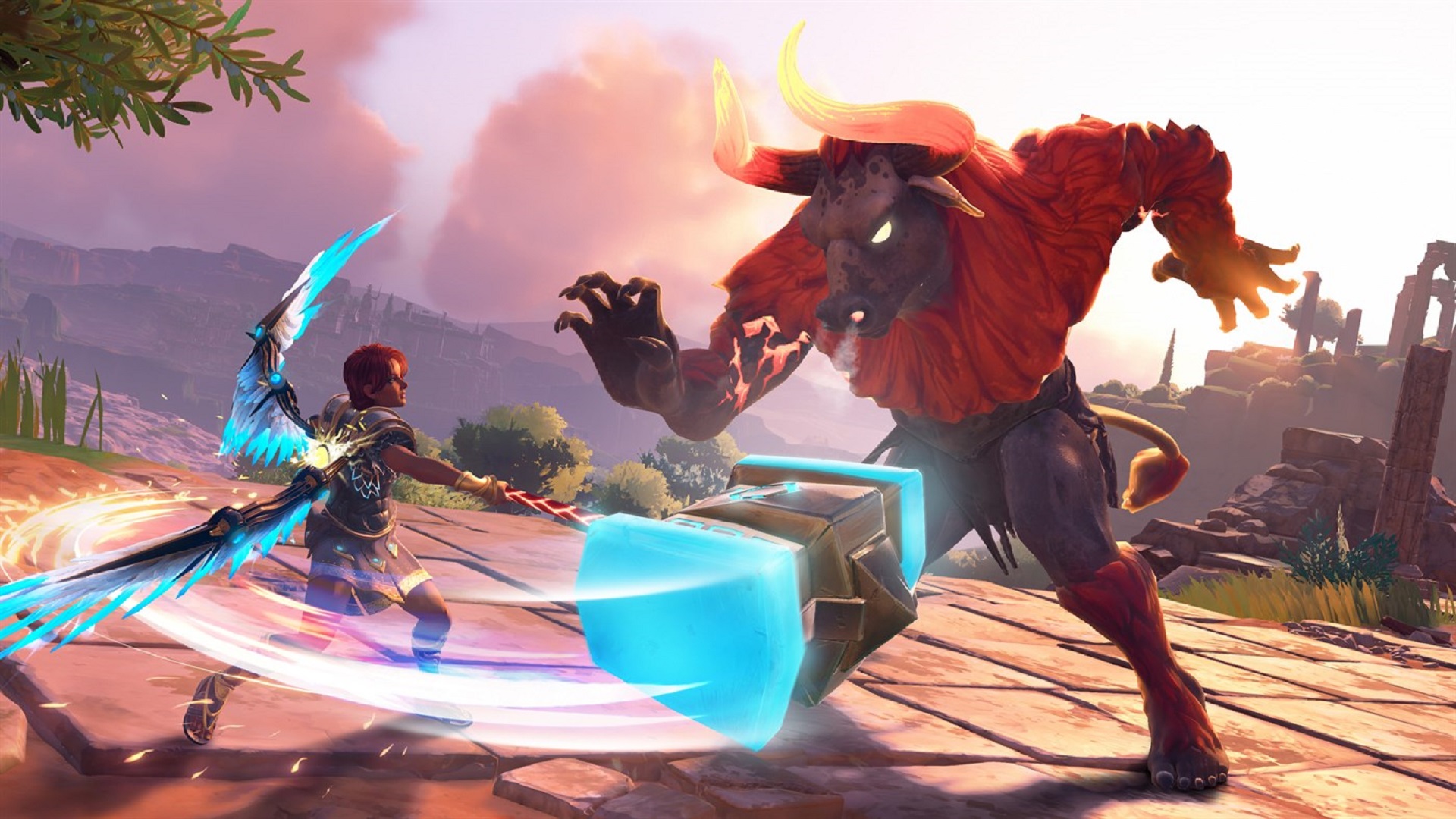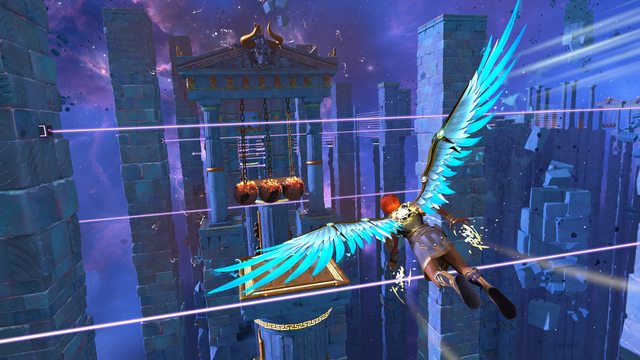Immortals Fenyx Rising Review – Rising and Falling
Immortals Fenyx Rising has had an interesting journey en route to launch. Originally beginning development as an offshoot of Assassin’s Creed Odyssey, over the course of the last year and a half, the game has gone through a delay, a mid-development overhaul, and even a name change. A mishmash of ideas taken from Assassin’s Creed Odyssey itself and from The Legend of Zelda: Breath of the Wild, Immortals has certainly looked like an interesting prospect for a while- and though it certainly has a lot going for it, it’s not a game without issues.
Set in the world of Greek mythology, Immortals Fenyx Rising sees you stepping into the shoes of a Greek warrior who is tasked with taking on the evil Typhon in order to put a stop to the Titan’s machinations. While you’d usually associate a Greek mythology setting with stories that take themselves all too seriously and are ripe with tragedies and violence galore, Immortals is a rather light-hearted game.
The duo of Zeus and Prometheus serve as narrators of the tale told in Immortals, with Prometheus taking the role of the eloquent poet who waxes lyrical and paints pictures with his words, and Zeus serving as the foil to his artistic tendencies by constantly butting in as the unreliable narrator and a treasure trove of jokes and quips. The two make a great pair, and inject a lot of charm and humour into the proceedings, with the interactions between them being a highlight in particular. Other characters are written with similar wit and irreverence as well, and on the whole, Immortals’ storytelling feels very much like an animated show for audiences of all ages. That light-hearted tone is a great choice for the game, because even though the story in and of itself is nothing special, the charming and easygoing humour will keep you constantly engaged.
"Even though the story in and of itself is nothing special, the charming and easygoing humour will keep you constantly engaged."
What’s really interesting about Immortals though – especially given the fact that it’s an open world title made by Ubisoft – is its size, which strikes a solid balance between being excessively massive the way modern open world games so often tend to be, and being a bit too condensed in a misguided overcorrection. Immortals’ world is still large and varied, but packed tightly and in a condensed manner, so that you never feel too overwhelmed by its proportions. It helps that as far as the art design is concerned, Immortals is absolutely gorgeous. It’s full of bold, bright colours that are used liberally and, at times, almost in excess, making for a world that feels like a wonderful, child-like water colour painting.
Traversing that world is also usually rather enjoyable. In this area, Immortals borrows from Breath of the Wild heavily, with the trifecta of stamina management, climbing, and gliding working together to deliver a movement system that fans of Nintendo’s 2017 masterpiece will be all too familiar with. Virtually every surface in the game you will come across is climbable, and combining that with jumping off of vantage points to glide across the land with your wings forms the backbone of how you move about the world. Like Breath of the Wild, climbing and gliding both deplete your stamina meter as well, and juggling all of those factors ensures that you’re never on autopilot.
That said, though Immortals ticks all the boxes of a Breath of the Wild-style traversal system and is fun in its own right, it isn’t quite as fun. For starters, your movement speed while you’re gliding is slower than you’d expect, especially given the fact that you’re literally flying with wings, which means the thrill of flight is somewhat muted. On top of that, simple platforming-focused actions like jumping, double-jumping, or even dodging don’t feel as tight or as responsive as they should. Jumps feel a bit too floaty, while dodges have more weight to them than they should. These are not major problems by any means, but they do come together to dull the edges of Immortals’ otherwise enjoyable traversal.
Then there’s exploration, which – like traversal – has its pros and cons. Immortals’ world is full of mini-dungeons to take on, chests to unlock, collectibles to hunt down, traversal challenges to tackle, puzzles to solve, and more, so there’s no shortage of things to do on paper. Usually, these activities are fun to track as well, which is largely helped by the world’s aforementioned condensed size and scope. That size, however, also acts as a bit of a double-edged sword.
"As far as the art design is concerned, Immortals is absolutely gorgeous. It’s full of bold, bright colours that are used liberally and, at times, almost in excess, making for a world that feels like a wonderful, child-like water colour painting."
I mentioned earlier that Immortals borrows heavily from both Assassin’s Creed Odyssey and Breath of the Wild, but it’s also lacking some key elements that made exploration in both those games so much fun (and for very different reasons). Odyssey’s world was brimming with quests and side quests to play through that usually entailed narrative-driven choices, while tearing through forts with either stealth or combat or a mixture of both was also incredibly addictive.
Immortals doesn’t have that- exploration is more about tracking down resources and collectibles to level up your health, stamina, abilities, weapons, and armour similar to Breath of the Wild, which means that even though there are, of course, still quests and side quests to hunt down, they take a bit of a backseat to exploring the world. What made that resource hunting in Breath of the Wild so much fun, however, was its spectacular physics and chemistry engine, which made interacting with essentially everything in the world an absolute joy, and opened up countless permutations and combinations in its staggeringly emergent and systemic gameplay. Immortals doesn’t have that either.
Put together, deficiencies in both those areas mean that Immortals ends up feeling like a pared back version of both, like a game that’s trying to emulate the success of genre giants, but never really reaching those same heights for one reason or the other. Don’t get me wrong, exploration is still fun, and there’s a nice variety of activities on offer here, but I was never really as engaged or immersed in the game’s world as I had hoped before starting it up that I would be.
Combat, gear, abilities, and progression all feel similarly derivative as well, yet not nearly as fleshed out as the games Immortals borrows from. Combat controls the exact same way as Odyssey, with light, heavy, and ranged attacks mapped to the shoulder buttons and triggers, and things such as perfect parries and perfect dodges opening up brief windows to let loose with flurries of attacks. There isn’t a ton of variety on offer in terms of weapons and gear- though that part I actually don’t mind too much, seeing as the game ends up putting more of an emphasis on making meaningful upgrades to the gear you already have rather than constantly bombarding you with new loot that ends up feeling disposable.
"Due to some deficiencies, Immortals ends up feeling like a game that’s trying to emulate the success of genre giants, but never really reaching those same heights for one reason or the other."
By now you must be pretty tired of the constant Breath of the Wild comparisons – I sure am getting tired of having to make so many of them – but there’s one other area where Immortals borrows from the Nintendo game liberally- the dungeons. Like the shrines in Breath of the Wild, Immortals’ world is littered with several mini-dungeons, known here as the Vaults of Tartaros. Offering puzzles and combat challenges, each of these Vaults tasks you with getting to their end point in different ways (with some also hiding secret chests with gear or cosmetics), and you’re rewarded at the end with a lightning bolt from Zeus, which can be used to add chunks to your stamina bar.
I enjoyed most of the Vaults in Immortals, and puzzle design was largely solid, barring a few that felt either too frustrating or too opaque. What I did not enjoy was the fact that visually, they pretty much look the exact same- which, again, is something Breath of the Wild fans will be familiar with. For a game that’s as diverse, vibrant, and beautiful in its open world as Immortals, the lack of visual variety and creative flair in these Vaults felt like a real letdown.
Though I have both good and bad things to say about most of Immortals, the one area that I think deserves absolute criticism is its technical issues. To be clear, these issues aren’t related to performance or visuals. The frame rate is solid, load times are lightning-quick (I played on an Xbox Series X), and the game doesn’t really suffer too much from things such as screen tearing, texture pop-in, or other bugs that Ubisoft open world games so often struggle with at launch.
But Immortals is very, very prone to crashing. In the time that I spent with the game, it felt like it was crashing once every couple of hours. One particular crash happened when I was making a manual save, at which point the game froze, forcing me to restart it. When I booted it up again, all my auto-saves from my previous play session had disappeared, the manual save I’d been trying to make had failed, and I essentially lost a good 2-3 hours of progress. Above all else, I hope Ubisoft focuses on these crashing issues with post-launch patches.
"Immortals is very, very prone to crashing. In the time that I spent with the game, it felt like it was crashing one every couple of hours."
All in all, Immortals Fenyx Rising is a decent game. Its world is beautiful, and exploration and traversal, in spite of some issues, are largely fun. At the same time, it also feels like a stripped back version of the games it tries to emulate, and with its technical issues, it unfortunately keeps getting in its own way.
Ubisoft has a bit of a history of fumbling their interesting ideas with inconsistent execution, but then striking home with second instalments that realize the full potential of those ideas- they did it with Assassin’s Creed, they did it with Watch Dogs. I hope they do it with Immortals as well, because there’s definitely something here that, if fostered properly, can turn into a winning formula. That might not be what it is in its current state, but I do hope to see Ubisoft taking another crack at this property, hopefully to do a better job with their second attempt.
This game was reviewed on the Xbox Series X.
* This article was originally published here



Comments